It's easy to feel lost when the news is full of talk about recessions and financial risks. It can feel overwhelming, like a storm is coming and you don’t know how to prepare. I remember a time when my own family faced unexpected financial hardship. The feeling of uncertainty and fear was palpable, and it felt like the ground beneath us was shifting. It’s not just about money; it was about security, about the future. That experience, and countless conversations with people navigating similar challenges, has fueled my passion for making complex topics accessible. That’s why I’ve put together this curated list of books – not to scare you, but to empower you. These books offer insights into how economies work, what can go wrong, and what we can learn from past crises. They're tools for understanding, for making informed decisions, and for feeling a little more in control, even when the headlines are unsettling. Let’s dive in.
Shocks, Crises, and False Alarms: How to Assess True Macroeconomic Risk
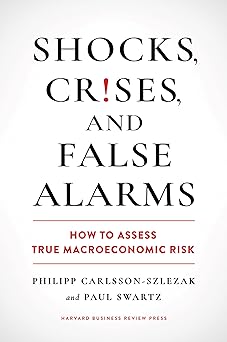
This book offers a fresh perspective on how to assess macroeconomic risk, a task that has become increasingly important in recent years due to the numerous shocks and crises that have affected the global economy. The authors, Philipp Carlsson-Szlezak and Paul Swartz, challenge conventional model-based thinking and present a more powerful approach to building sound macroeconomic judgment. They demonstrate how to use incisive analysis built upon frameworks, historical context, and structural narratives to navigate the complex landscape of economic risks. The book also provides a nuanced approach to understanding the narratives of economic collapse and decline, revealing that many of these predictions are often false alarms. Instead, the authors show how to identify the fundamental strengths of the current economic era, which they call the "era of tightness." By providing a rational and optimistic approach to understanding macroeconomic risks, the book offers a valuable tool for leaders and individuals looking to make informed decisions in a rapidly changing economic environment. The authors' approach emphasizes the importance of using one's own judgment and navigating away from blinkered dashboards and flashy headlines. Ultimately, the book provides a much-needed compass for navigating the complex global economy and helps readers to make better tactical and strategic decisions.
Discover this book on Amazon (affiliate link)
The Federal Reserve and the Financial Crisis
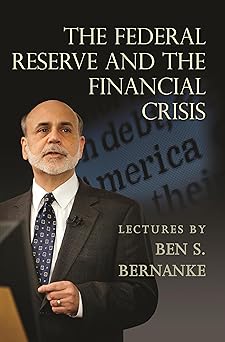
I recently had the privilege of sitting in on a series of lectures by Ben Bernanke, former chairman of the US Federal Reserve, which offered a unique glimpse into the central bank's actions during the 2008 financial crisis. It was a truly eye-opening experience, and one that made me appreciate the weight of responsibility that rests on the shoulders of those who guide the economy. Bernanke took us on a journey through the history of the Federal Reserve, from its humble beginnings in 1914 to its current role as the lender of last resort. He spoke candidly about the challenges the Fed faced, from high inflation in the 1970s to the Great Moderation of the 1990s and 2000s. What struck me most was the complexity of the decisions that Bernanke and his predecessors made, and the often-treacherous terrain they navigated to keep the economy afloat. Bernanke also made it clear that monetary policies alone cannot solve the deep-seated problems that plagued the financial system, and that a comprehensive overhaul of regulations and policies is needed to prevent future crises. As I listened to Bernanke's words, I couldn't help but feel a sense of awe at the scale and gravity of the task he undertook to stabilize the global economy after the crash of 2008. His insider's perspective on the Fed's inner workings was both insightful and humbling, and I left the lectures with a newfound appreciation for the critical role that this institution plays in shaping our economic destiny.
Discover this book on Amazon (affiliate link)
How Markets Fail
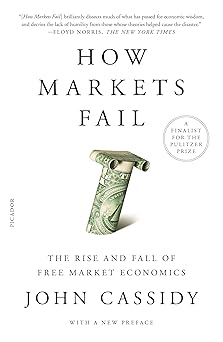
I've always been fascinated by the complexities of human behavior and how they impact our economies. Recently, I had the opportunity to dive into a book that shed light on how markets fail, and I must say it was a eye-opening experience. The author, John Cassidy, takes us on a journey to explore how fifty years of economic thinking have led to some of the most catastrophic consequences we've seen in recent history, including the 2008 financial crisis. Cassidy argues that the rise of "utopian economies" has been a major contributor to these failures, and it's a perspective that resonates deeply with me. I remember reading about the devastating effects of industrialization on rural communities, and how the unchecked pursuit of profit has led to some of the most egregious environmental crimes. Cassidy's writing is clear and concise, making the complex economic theories accessible to anyone who's willing to listen. What struck me most was the author's ability to weave together vivid anecdotes, on-the-ground reporting, and clear explanations to paint a picture of a system that's fundamentally flawed. Cassidy warns us that following old orthodoxies isn't just misguided, it's downright dangerous, and that's a message that we need to be hearing loud and clear.
Discover this book on Amazon (affiliate link)
Stress Test: Reflections on Financial Crises
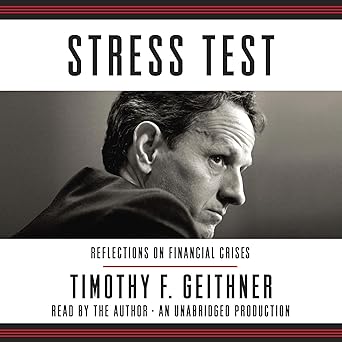
I just finished reading a book that has left me with a lot to think about, and I feel compelled to share its story with all of you. The book is the memoir of Tim Geithner, who was a key player in the United States' response to the 2008 financial crisis. As president of the Federal Reserve Bank of New York and later as President Barack Obama's secretary of the Treasury, Geithner witnessed firsthand the crisis unfold and played a crucial role in navigating it. The book is a candid and riveting account of the hard choices and difficult decisions that Geithner made to repair the financial system and prevent a second depression. He takes us behind the scenes of the crisis, revealing the inner workings of the policy-making process and the high-stakes decisions that were made in a state of uncertainty. Geithner shares his own story, from his childhood as an American abroad to his early days as a young Treasury official, and he recounts the most controversial episodes of his time, including the rescue of Bear Stearns and the AIG bailout. He also describes the aftershocks of the crisis, including the struggle to address high unemployment and the drama over Europe's economic woes. What struck me most about this book is Geithner's willingness to share his perspective on politics, which is often seen as a dirty game. He reveals the silliness, the nastiness, and the toll that politics took on his family, but ultimately, the book is a hopeful story about public service and the importance of doing what's right, even when it's hard.
Discover this book on Amazon (affiliate link)
The Holy Grail of Macroeconomics: Lessons from Japan's Great Recession
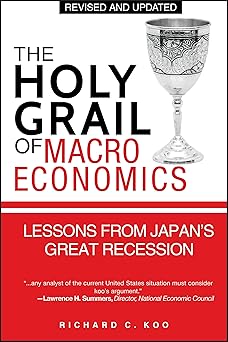
This book is a must-read for anyone struggling to understand the current financial crisis. The author delves into the 15-year long recession in Japan, exploring the underlying causes and the impact it had on the world of macroeconomics. The book presents a unique perspective on the subject, introducing the concept of yin and yang business cycles - where conventional profit maximization is the yang, and companies prioritizing debt minimization is the yin. This idea challenges the long-held theories in macroeconomics, which have been overlooked in favor of a more traditional approach. The author's insightful analysis reveals how conventional economists missed the mark, and how this new understanding can serve as a guiding light for navigating the current economic turmoil. What struck me most about this book was the author's ability to explain complex concepts in a clear and concise manner, making it accessible to readers without a deep understanding of economics. The author's passion for the subject shines through on every page, making this book not just a read, but an experience that will leave you thinking about the nature of economic cycles and the importance of balance. The revised edition of this highly acclaimed work is a testament to the author's dedication to sharing their knowledge and helping readers make sense of a complex world.
Discover this book on Amazon (affiliate link)